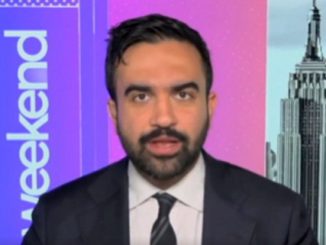
Published July 13, 2025
Zohran Mamdani Slams Billionaires—While Benefiting from Billionaire-Backed Campaign Funding
New York City mayoral candidate Zohran Mamdani is making headlines—not just for his bold anti-billionaire rhetoric, but for the irony critics see in the sources of his political backing.
A self-proclaimed democratic socialist and current New York State Assembly member, Mamdani recently stated:
“I don’t think that we should have billionaires.”
He argues that extreme wealth inequality is a threat to democracy, pointing to New York’s staggering wealth divide: 123 billionaires holding a combined $759 billion while large segments of the population struggle with poverty and homelessness.
Despite his call for a city and nation without billionaires, Mamdani’s political rise is reportedly buoyed by financial support from billionaire-linked entities—particularly those tied to left-wing megadonor George Soros.
Billionaire George Soros has a long history of funding socialist and other lefty causes — and politicians who support them.AFP via Getty Images
💸 The Soros Connection
According to the New York Post and The Gateway Pundit, Soros’s Open Society Foundations have funneled more than $37 million into progressive groups such as the Working Families Party (WFP)—a major backer of Mamdani’s campaigns. These groups provide crucial infrastructure, endorsements, and voter outreach support.
This support has triggered sharp criticism from conservative outlets and political opponents who argue Mamdani is hypocritically benefiting from the very class he publicly condemns.
A breakdown of how Soros’s money is being used to assist Mamdani’s mayoral run.Tam Nguyen / NYPost Design
🤔 Rhetoric vs. Reality
In a June 2025 interview covered by Business Insider, Mamdani clarified that while he believes billionaires shouldn’t exist in a just society, he’s willing to collaborate with the wealthy if it means achieving tangible improvements for the city.
This has been framed by his allies as pragmatic progressivism, but to critics, it reeks of contradiction.
The Working Families Party tapped Mamdani as its favored candidate in the mayoral race.LP Media
George Soros’ Open Society Foundation has indirectly funneled over $37M combined to the Working Families Party and other left-wing groups who helped Zohran Mamdani win NYC’s Democratic mayoral primary.Michael Nigro
🔍 Critics Respond
Critics—particularly conservative commentators—see Mamdani’s stance as emblematic of elite-backed socialism: populist in language, yet dependent on the wealth and influence of progressive billionaires.
They argue that this dynamic undermines his moral authority to speak on income inequality and wealth redistribution.
One NY Post editorial put it bluntly:
“You can’t rail against billionaires while climbing a ladder built by one.”
 Resulting Effects:
Resulting Effects:
🔥 1. Backlash Over Hypocrisy
Mamdani’s anti-billionaire stance, paired with reports of funding ties to billionaire George Soros, has triggered a wave of criticism—especially from conservative media and centrist Democrats.
Many voters see a contradiction between his rhetoric and reality, weakening the authenticity of his message.
Effect: Erosion of trust among independents and moderate voters who might have otherwise been drawn to his economic justice platform.
🗳️ 2. Polarized Public Opinion
Progressive supporters defend Mamdani, arguing that using wealthy donors’ money to dismantle the system is a form of strategic irony. Opponents say it’s blatant hypocrisy.
The story has deepened the divide between the far left and more traditional liberal or centrist blocs in New York politics.
Effect: Strengthening of ideological echo chambers; intensifying the battle for control within the Democratic Party.
🏛️ 3. Increased Scrutiny on Campaign Financing
The controversy is fueling broader scrutiny over how “anti-establishment” candidates are funded.
Journalists and watchdog groups are now more actively examining who backs socialist candidates—and whether grassroots funding claims hold up.
Effect: Greater transparency demands and accountability pressures across all political campaigns, especially among left-leaning candidates.
📢 4. Media Spotlight and National Attention
The national coverage has thrust Mamdani into the spotlight—potentially raising his profile beyond NYC.
While the attention includes criticism, it also energizes his base, attracting donations and volunteers from across the country.
Effect: Dual outcome: surge in campaign visibility and potential fundraising boost, but at the cost of mainstream credibility.
🧩 5. Narrative Ammunition for Opponents
Republicans and moderate Democrats are now armed with a new talking point: that leftist candidates are funded by the same elites they decry.
This may be used strategically in debates, ads, and opposition research.
Effect: Strengthened anti-socialist messaging campaigns; easier path for rivals to paint Mamdani as disingenuous or manipulated by elite interests.
📊 6. Impact on Progressive Momentum
This incident may affect other progressive candidates who rely on similar donor ecosystems.
The perception of hypocrisy could dampen enthusiasm among voters who seek authenticity and ideological purity.
Effect: Risk of reputational damage to broader progressive movements and their aligned organizations like DSA or WFP.
 Bottom Line:
Bottom Line:
Zohran Mamdani’s clash between rhetoric and reality encapsulates the growing tension within progressive politics: the moral call to dismantle concentrated wealth versus the practical reliance on billionaire-funded support systems to win elections.
While Mamdani champions a vision of economic justice and rails against the existence of billionaires, his alignment with groups backed by George Soros has sparked serious questions about consistency and credibility. Supporters argue it’s a necessary compromise in a broken system; critics call it hypocrisy that undermines the very values he claims to represent.
Ultimately, this controversy may serve as a turning point—not just for Mamdani’s mayoral run, but for the progressive movement at large. It forces a reckoning: Can anti-capitalist candidates effectively challenge elite power while still being entangled in it?
Whether voters view Mamdani as a principled reformer or a performative opportunist may shape not only his political future, but the credibility of the broader socialist agenda in American urban politics.









Be the first to comment